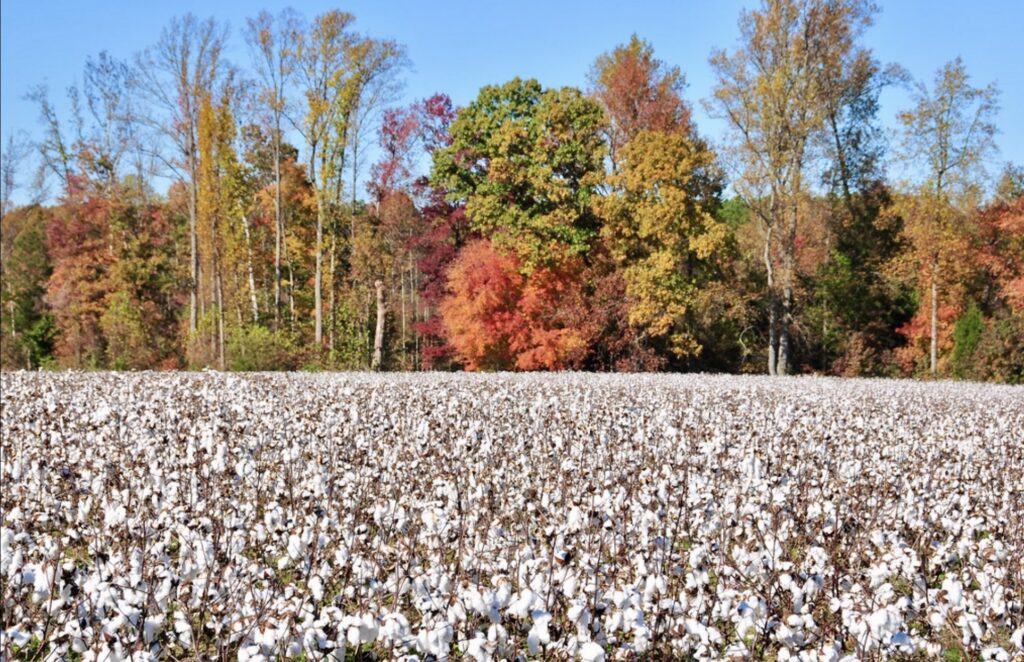Harvests Rarely Come Easy
Here in South Carolina, you can still see miles of white cotton fields stretching across the countryside each fall. Their white rows shine beneath the bright autumn sun, standing in bold contrast to the reddish-brown earth. The fields seem to go on forever, like snow spread across the countryside. It’s a sight that still takes my breath away every time I see it. Yet those who have worked these fields know all too well that beneath their beauty lies a reality of hard labor and great cost.
Before machinery changed the landscape, harvesting cotton was grueling work. From sunup to sundown, workers stooped low under the blistering heat, their fingers raw from pulling the sharp bolls. My dad often told me about picking cotton as a boy and how the bolls would slice into his hands until they were raw and bleeding. Those stories remind me that what appears beautiful from a distance often hides a painful reality and comes at a great cost.
Every pound of cotton carried with it the heavy sweat and deep pain of the laborer. My point is simply that the harvest didn’t come easy. It never does!
Jesus once looked over the crowds with deep compassion and said to His disciples:
“The harvest is plentiful, but the laborers are few.” — Matthew 9:37 (NIV)
Those words seem to echo across every generation. The harvest of souls is still abundant, but the call for laborers remains urgent. Spiritual harvests, like physical ones, come with a cost. They require people willing to get their hands dirty, hearts engaged, and knees bent in prayer.
There’s Always a Cost Involved
There’s no such thing as effortless ministry. Souls aren’t gathered by convenience. Lives aren’t changed by casual participation. Spiritual fruit doesn’t grow in the soil of comfort; it grows in the soil of commitment.
Spiritual fruit does not grow in the soil of comfort; it grows in the soil of commitment. Every revival, every transformed life, every breakthrough in the Kingdom has come through people who were willing to labor. People who prayed when no one noticed, gave when it hurt, and loved when it was not easy.
To be a laborer in God’s field is to say, “Lord, I’ll go where it’s hot, hard, and humbling, because You are worthy.”
You and I Have a Call to Pray
When Jesus said, “The laborers are few,” He didn’t stop there. He gave a simple command:
“Ask the Lord of the harvest, therefore, to send out workers into His harvest field.” — Matthew 9:38 (NIV)
Notice that He didn’t say, “Complain about the shortage.” He said, “Pray.”
The first step toward multiplying Kingdom workers isn’t recruiting. It’s interceding. Every great move of God begins when someone starts praying for more hands to help gather what’s ripe for the Kingdom.
How Will You Respond?
Here’s the irony I’ve discovered over the years, every time I start praying, God usually begins His work in me first. I can’t count how many times I’ve prayed for God to move in someone else’s life, only to realize He was moving in mine. Prayer has a way of turning the spotlight back on our own hearts.
I’ve come to believe that when we sincerely pray for God to send laborers into His harvest, He often stirs our own hearts to go. The one who prays for workers may very well become one. God rarely lets us pray from the sidelines, He pulls us onto the field.
So, it only seems fitting that like Isaiah, we must be willing to say,
“Here am I, Lord, send me.” — Isaiah 6:8 (NIV)
Because praying for the harvest is never just about others, it’s about obedience. It’s about letting God write our name into the very answer we were praying for. Therefore, I urge you to remember, the harvest is plentiful and the laborers are few.
- So, let’s pray for more laborers.
- And, let’s be willing to become those laborers.
And let’s never forget that the Kingdom’s greatest harvests come through hands willing to bleed a little for the sake of others. May we be willing to experience a little pain for the possibilities of bringing in a great harvest for the Kingdom of God.
Today’s Prayer:
Heavenly Father, You are the Lord of the harvest, and Your heart still beats for the lost. You’re the Lord of the harvest, and I know Your heart still beats for those who don’t know You. My prayer today is that my heart would beat the same passion as Yours. So, open my eyes to see the people around me who are need to experience Your love and salvation. And, forgive me for the times I’ve chosen my own comfort over Your calling. Strengthen my hands, steady my steps, and fill me with Your love for the lost. And make me more willing and able to work with you to bring in the harvest. I pray this in Jesus’ name, Amen.



I grew up in Alabama and as a young teenager worked one day in a cotton field with my best friend whose uncle raised cotton. It was a really rough job and I earned a whopping three dollars that day. That’s what they paid if you picked 100 pounds of cotton. I’m pretty sure that was the hardest day of work that I’ve ever had. The men that picked cotton for a living could easily pick three or 400 pounds a day, some with two bags around their neck and would pick with both hands. My experience was one of trying to hold the cotton branches with one hand and try to carefully pick the little piece of cotton out of the thorny Hulk with my other hand. You couldn’t wear gloves annd still grab the little cotton wad, and so my hands were definitely sore for over a week.
I remember when the first cotton picking machines were invented and used… that the fields would often still be dotted with white patches of cotton that the machine just seemed to skip over. It was so much faster than the human efforts of men and women who would pick that field clean and make sure that every cotton pod would be taken to the barn. In those days when you drove down the road, it was easy to see the fields that were harvested quickly and mechanically because they had lots of cotton left. Some farmers would pay for cotton pickers to go back over the fields and try to harvest what had been left behind, but it never paid very well because it took twice as long to fill your bag. So there seemed to always be sadness when you drove by those fields that had not been completely harvested and cotton had been left behind. I’m sure there’s a spiritual lesson in here somewhere, but your challenging message stirred up old memories. Nevertheless, The challenge remains the same… that the harvest field is White and ripened unto harvest , and there’s really no quick way to get it done without hard labor. I just guess that my heart is stirred and challenged that I don’t take the easy route and leave a lot of precious harvest in the field.